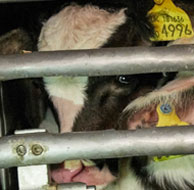
Fresh concerns over welfare of live exports
The RSPCA successfully stopped a lorry transporting 247 calves after it was at risk of exceeding the legal maximum live transport time.
Currently, calves are not allowed to be transported for more than nine hours before a one-hour rest period, and not for longer than 21 hours before a 24-hour rest period.
The lorry in question was stopped at Ramsgate port where the animals were due to be transferred to a delayed ship. The journey was estimated to be a planned 70 hours in length; travelling from Scotland to Spain.
Ruminant welfare specialist at the RSPCA, John Avizienius, commented: “This is a stark reminder that our current laws do not go far enough to protect those animals transported across long distances.
“Currently, transport companies arrange and time the distances down to the minute to take these animals on a journey as long as legally possible, but this week’s journey shows that just one delay can mean a breach of the law.
“Until the long-distance live transport of animals is banned completely, we can never be sure that animals will not continue to suffer on these long, arduous journeys across the continent.
“Currently, sheep, calves, chickens and horses are all exported from the UK, and once they’re off the ship on the continent, we aren’t there to protect them and don’t know how long they’ll be transported.
“Having seen photographs of the calves, we have concerns about their hydration and general health and the question needs to be asked as to whether they were really fit to travel?
“The RSPCA wants to see an end to this cruel practice.”
Image (c) RSPCA



 The veterinary mental health charity Vetlife is inviting the veterinary community to join it for a sponsored cold-water dip.
The veterinary mental health charity Vetlife is inviting the veterinary community to join it for a sponsored cold-water dip.